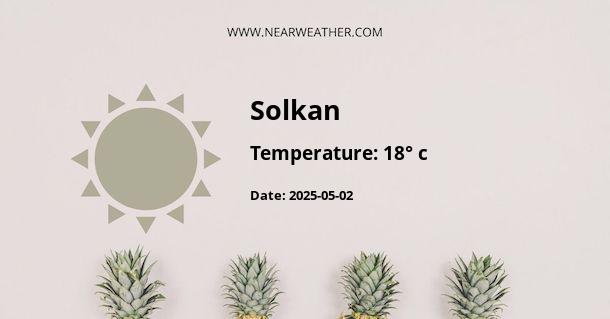Understanding Solkan's Climate and Weather Year Round
Solkan, a settlement in the municipality of Nova Gorica in the western part of Slovenia, is situated by the Soča River. The area is known for its diverse climate, influenced by its proximity to both the Adriatic Sea and the Alpine mountain range. This unique positioning results in a climate that is characterized by features of both Mediterranean and Continental climates.
Geographic and Climatic Overview
Solkan benefits from a generally mild climate but experiences variations due to the intricate topography of the region. The Soča Valley plays a crucial role in the area's climate. Here's a closer look at what this means throughout the year.
Temperature and Precipitation Patterns
| Season | Temperature Range | Precipitation |
|---|---|---|
| Spring | 8°C to 20°C | High, with frequent rain showers |
| Summer | 18°C to 30°C | Moderate, with less frequent but heavy rainfalls |
| Autumn | 10°C to 22°C | High, with steady rain common |
| Winter | -2°C to 8°C | Low to moderate, with snowfall in the surrounding hills |
Seasonal Climate Details
- Spring: This season sees a gradual increase in temperature and daylight hours. Spring in Solkan often brings unpredictable weather, with intermittent rainy periods followed by sunny days. This fluid weather pattern leads to the blossoming of the region’s flora and the reawakening of its fauna.
- Summer: Solkan's summers are warm and welcoming. The region experiences the highest temperatures and longest days of the year, with plenty of sunshine making it ideal for outdoor activities. While heatwaves can occur, the nearby sea often provides a cooling breeze, moderating the temperatures.
- Autumn: Marked by a noticeable drop in temperature, autumn brings about a richness of colors in the local vegetation. It is also a period with a significant amount of rainfall, which replenishes the region's waterways and prepares it for the colder months.
- Winter: Winters are generally cool, with occasional cold snaps bringing frost and snow, particularly in the elevated areas surrounding the valley. However, the influence of the Mediterranean climate ensures that extremely low temperatures are not a common occurrence.
Wind and Weather Systems
"The intersection of Alpine and Mediterranean climatic zones gives rise to varied weather patterns in Solkan. The region is subject to both bora and sirocco winds, which significantly influence its weather conditions." – Local Meteorological Institute
These winds are particularly significant: the bora is a cold, dry wind that comes from the northeast and can lead to clear, crisp weather, while the sirocco is a warm, moist wind from the southeast that often brings rain and sometimes even storms.
Annual Weather Statistics
Average Temperature and Rainfall
| Month | Average High (°C) | Average Low (°C) | Average Rainfall (mm) |
|---|---|---|---|
| January | 6 | -1 | 70 |
| February | 8 | 0 | 65 |
| March | 12 | 3 | 80 |
| April | 17 | 7 | 95 |
| May | 22 | 12 | 110 |
| June | 25 | 15 | 140 |
| July | 28 | 17 | 100 |
| August | 27 | 17 | 111 |
| September | 23 | 14 | 150 |
| October | 18 | 10 | 170 |
| November | 12 | 5 | 180 |
| December | 7 | 1 | 120 |
Climate Influences on Local Life
The climate in Solkan not only shapes the environment but also influences the way of life of its inhabitants. Agriculture, for instance, benefits from the area's fertile soils and adequate rainfall. The warm, sunny summers allow for the cultivation of a variety of crops, including the region's renowned wines.
Moreover, Solkan's weather encourages outdoor activities such as hiking, cycling, and river sports on the Soča River. These recreational opportunities are pivotal for both the local economy and the well-being of its residents.
Expert Opinions on Climate Adaptation
"As climate patterns globally shift, regions like Solkan must adopt adaptable agricultural practices and sustainable tourism strategies to maintain economic stability and environmental health." – Environmental Research Analyst
Climate Change Considerations
Although Solkan enjoys a relatively stable climate, climate change introduces new challenges. Rising global temperatures could lead to more frequent and intense heatwaves in the summer, while changing precipitation patterns could affect the area's water resources and agriculture.
Local initiatives to combat climate change focus on reducing carbon footprints, conserving natural areas, and promoting awareness. Investment in renewable energy sources such as solar and hydroelectric power is also on the rise, with the potential to harness the ample sunlight and riverine resources of the region.
Final Insights into Solkan's Climate
In conclusion, Solkan's climate is a complex interplay between continental and Mediterranean influences, resulting in a diverse and seasonally variable environment. From the blossoming springs to the crisp winters, each season brings its own character to the region. Understanding and adapting to these climate patterns is essential for the sustainable development of Solkan and to ensure the community thrives in harmony with its natural surroundings.
A - Solkan's Latitude is 45.971390 & Longitude is 13.649440.
A - Weather in Solkan is 18° today.
A - Climate Conditions in Solkan shows clear sky today.
A - Humidity in Solkan is 72% today.
A - Wind speed in Solkan is 4.79 km/h, flowing at 61° wind direction. today.
